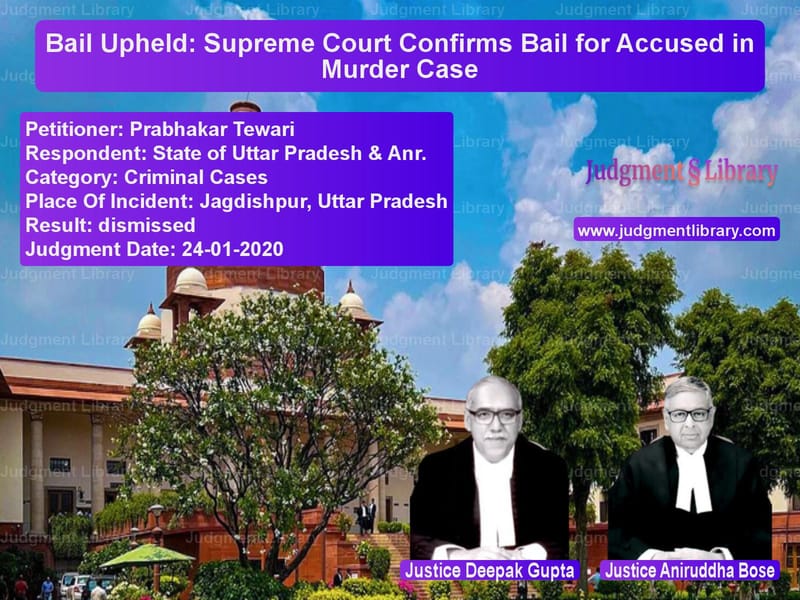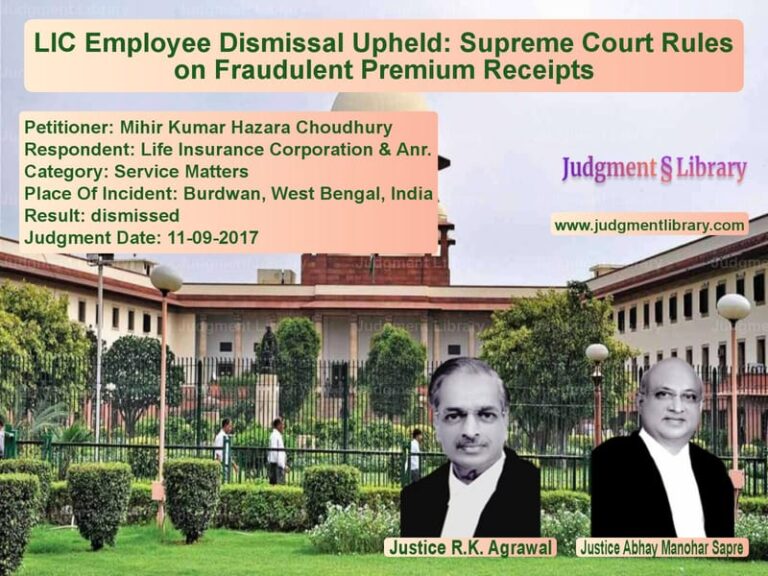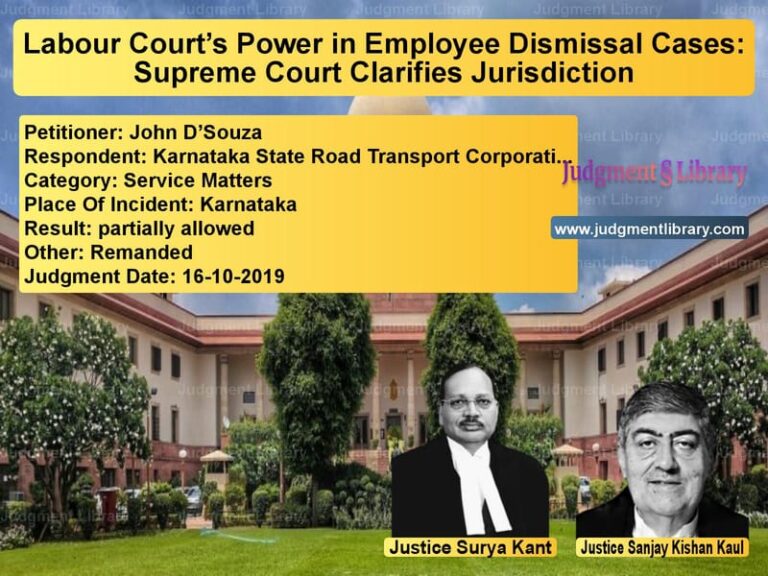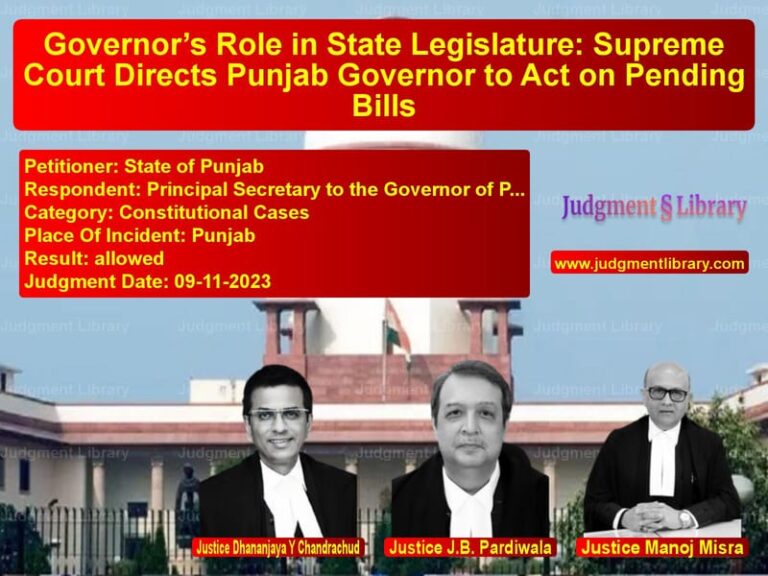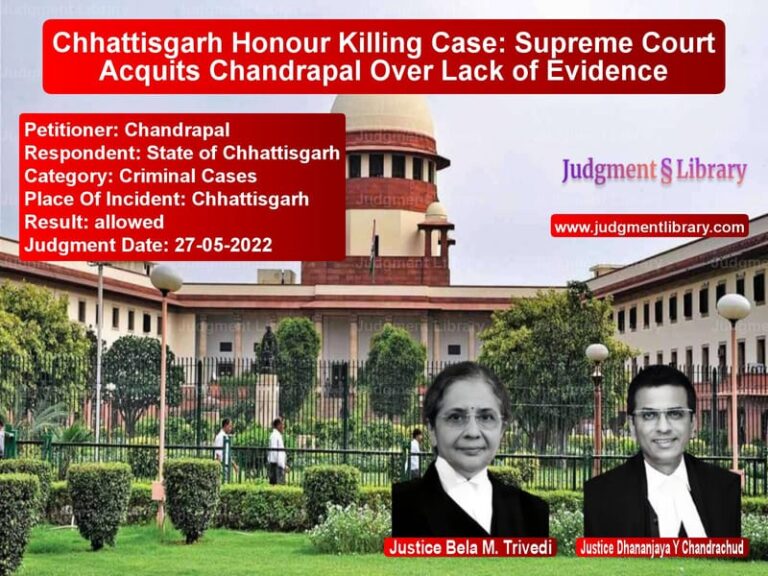Bail Upheld: Supreme Court Confirms Bail for Accused in Murder Case
The case of Prabhakar Tewari v. State of Uttar Pradesh & Anr. revolves around the issue of bail granted to two accused in a murder case. The Supreme Court, in its judgment dated January 24, 2020, upheld the bail granted by the High Court to the accused, rejecting the plea for its cancellation. The judgment examines the criteria for granting bail, the relevance of criminal antecedents, and the factors influencing the court’s discretion.
This case highlights the fundamental principles of bail jurisprudence and reaffirms that bail should not be denied merely based on the seriousness of the offense but should consider various legal parameters, including the presence of a prima facie case and the potential for interference with the judicial process.
Background of the Case
The case originated from an incident that took place on February 7, 2019, in which the deceased, Purushottam Dutt Tiwari, was shot dead while returning home from court. The First Information Report (FIR) was lodged by his son, Prabhakar Tewari, at Police Station Jagdishpur, Uttar Pradesh. The FIR named five individuals, including the two accused who later sought bail: Vikram Singh alias Vikki and Malkhan Singh.
The prosecution alleged that the accused conspired to kill the deceased and executed the plan by ambushing him near Warisganj Railway Station. Witness statements recorded later supported the prosecution’s claims. However, the accused contended that the evidence against them was weak and that they had been falsely implicated.
High Court’s Decision to Grant Bail
The Allahabad High Court granted bail to both accused, citing the following factors:
- The delay in recording witness statements weakened the case against the accused.
- No direct involvement of the accused in the shooting was established.
- The accused had been in custody for several months without trial proceedings progressing significantly.
- The court found no substantial evidence indicating that the accused would tamper with witnesses or evade the legal process.
These considerations led the High Court to conclude that the accused were entitled to bail pending trial.
Arguments by the Petitioner (Prabhakar Tewari)
- The accused had multiple pending criminal cases and a history of violence.
- Witness statements, including that of Narendra Dev Upadhyay, clearly implicated the accused in the conspiracy.
- The seriousness of the offense (murder) warranted denial of bail.
- The accused posed a threat to witnesses and could interfere with the investigation.
Arguments by the Respondents (Vikram Singh & Malkhan Singh)
- The FIR did not explicitly mention their direct involvement in the shooting.
- Witness statements were recorded after significant delay, raising doubts about their reliability.
- The accused had already spent considerable time in custody without trial proceedings moving forward.
- The High Court had exercised its discretion properly, and no exceptional grounds existed for interfering with the bail order.
Supreme Court’s Judgment
The Supreme Court upheld the High Court’s order granting bail, emphasizing the following points:
- Absence of Direct Involvement: The Court noted that the accused were not directly implicated in the act of shooting.
- Delay in Witness Statements: The significant delay in recording key witness statements weakened the prosecution’s case.
- Judicial Discretion in Bail Matters: The Supreme Court reaffirmed that appellate courts should not interfere with bail orders unless they suffer from serious legal infirmities.
- Criminal Antecedents Not Sole Determinant: While the accused had prior criminal records, the Court held that past cases alone could not justify denying bail if the prosecution’s case lacked substantial merit.
- Protection of Personal Liberty: The Court stressed that bail is a crucial aspect of personal liberty and should not be denied unless compelling reasons exist.
The Court ruled that there was no error in the High Court’s exercise of discretion and dismissed the appeal seeking cancellation of bail.
Legal Precedents Cited
- Mahipal v. Rajesh Kumar (2019) – Established that bail cancellation requires a finding of legal infirmity in the granting order.
- Raghubir Singh v. State of Bihar (1986) – Laid down the principles for cancellation of bail, including interference with investigation and intimidation of witnesses.
- State of Maharashtra v. Ritesh (2001) – Held that courts must balance individual liberty with the need for a fair trial when deciding bail matters.
Impact of the Judgment
This ruling reinforces important legal principles:
- Bail should not be canceled lightly: Once granted, bail should only be revoked under compelling circumstances.
- Past criminal records are not the sole criterion for bail: Each case must be decided on its merits, not just on an accused’s history.
- Delays in investigation can weaken the prosecution’s case: Courts must scrutinize the timing of witness statements and evidence.
- Appellate courts must respect trial court discretion: Higher courts should not interfere with bail decisions unless there is clear evidence of error.
The Supreme Court’s decision ensures that bail jurisprudence remains fair and balanced, safeguarding both individual rights and the integrity of criminal proceedings.
Petitioner Name: Prabhakar Tewari.Respondent Name: State of Uttar Pradesh & Anr..Judgment By: Justice Deepak Gupta, Justice Aniruddha Bose.Place Of Incident: Jagdishpur, Uttar Pradesh.Judgment Date: 24-01-2020.
Don’t miss out on the full details! Download the complete judgment in PDF format below and gain valuable insights instantly!
Download Judgment: Prabhakar Tewari vs State of Uttar Prade Supreme Court of India Judgment Dated 24-01-2020.pdf
Direct Downlaod Judgment: Direct downlaod this Judgment
See all petitions in Bail and Anticipatory Bail
See all petitions in Murder Cases
See all petitions in Judgment by Deepak Gupta
See all petitions in Judgment by Aniruddha Bose
See all petitions in dismissed
See all petitions in supreme court of India judgments January 2020
See all petitions in 2020 judgments
See all posts in Criminal Cases Category
See all allowed petitions in Criminal Cases Category
See all Dismissed petitions in Criminal Cases Category
See all partially allowed petitions in Criminal Cases Category

